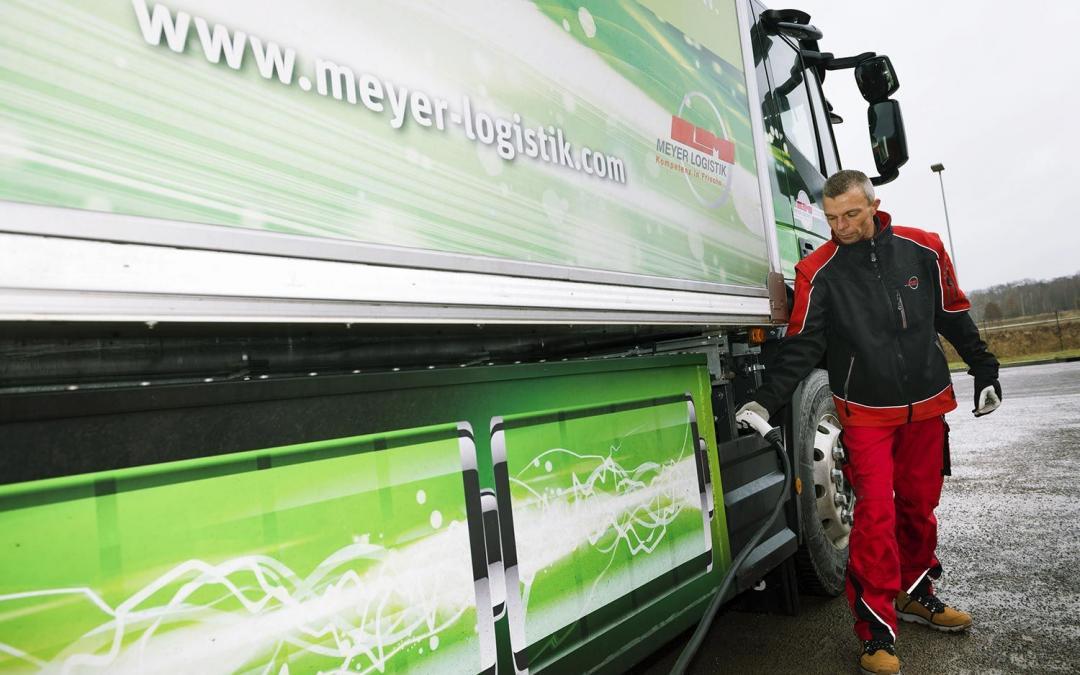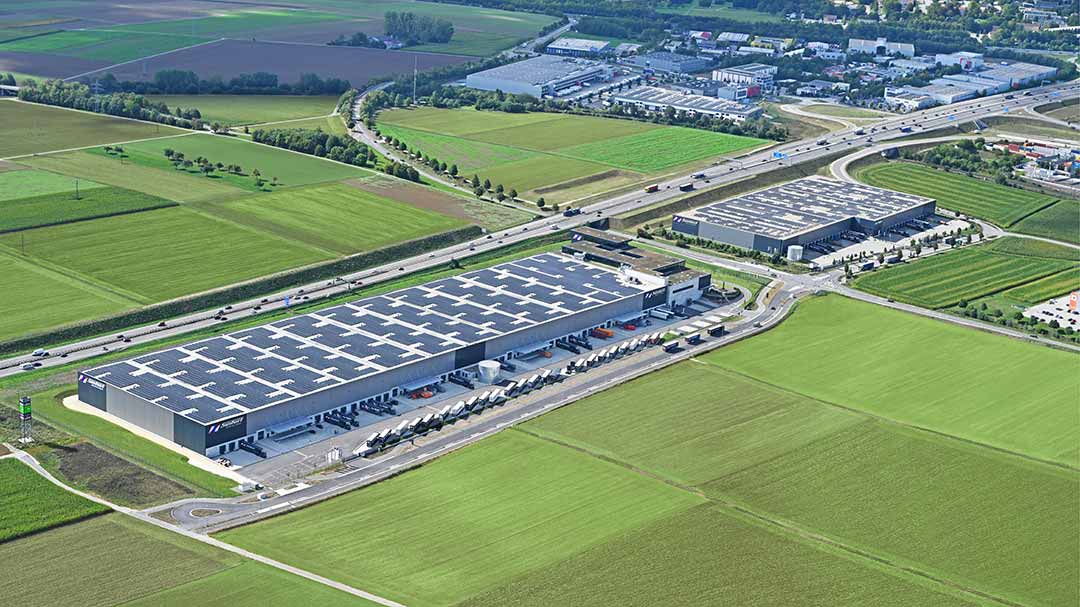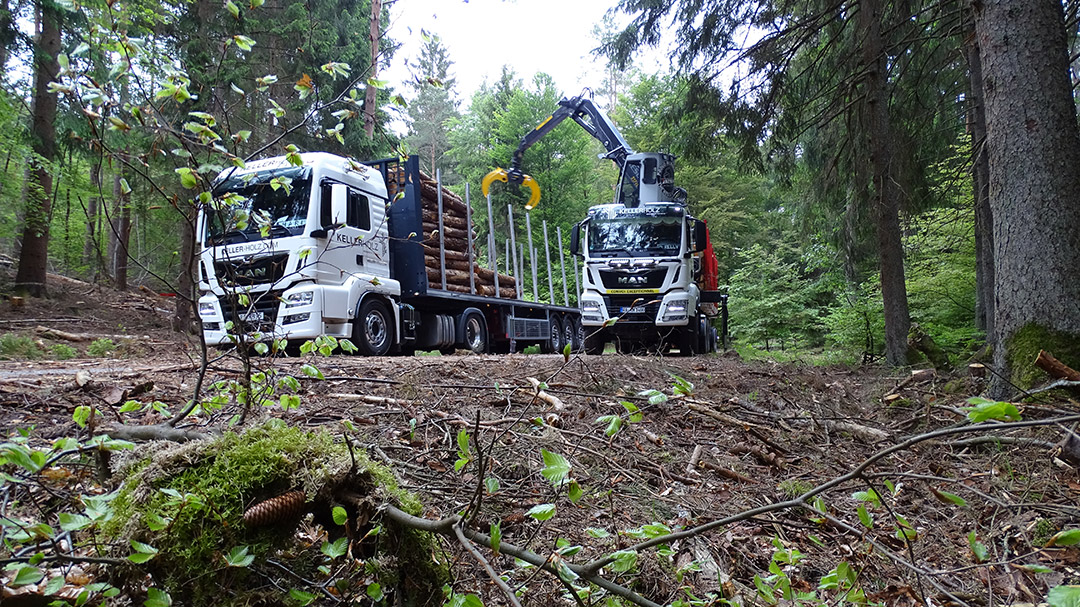Text: Sabine Philipp
Photos: Meyer Logistik, Steffen Kugler
Meyer Logistik is very interested in new technologies that make transport more sustainable for people and the environment. The family-owned company is particularly keen on alternative drives that enable green logistics. The company, which specialises in temperature-sensitive goods, also works closely with suppliers, customers and universities.
Transporting chilled products is a tricky business: a couple of degrees too warm and products such as mince or ice cream will become unsellable. The fresh goods logistics company Meyer Logistik from the German town of Friedrichsdorf began integrating telematics into its refrigerated vehicles due to a major client from the catering industry. When Meyer Logistik was looking for providers with suitable solutions, idem telematics stood out. The cloud-based system uses temperature sensors in the chilled chambers to continuously transmit the temperatures. Dispatchers and customers are therefore always kept informed about the condition of their goods, as well as the vehicle’s location and the delivery time – which the system also calculates in real time.
Customer requirements also prompted Meyer Logistik to develop a multi-temperature system, which was produced in cooperation with the Straubing-based body and trailer manufacturer ROHR. Multi-temperature bodies are standard in the industry today. They enable frozen, dried and chilled goods such as fish to be transported together in one journey. The modular chambers can be combined and can be cooled to different temperatures ranging from –24 to +25 degrees. ‘Our aim is to transport as many products as possible with as few truck loads as possible and so cut emissions,’ explains Managing Director Matthias Strehl. The expert logistics manager regularly discusses new ideas with suppliers. The focus is predominantly on alternative drive concepts: ‘We can well imagine the entire Meyer fleet having environmentally friendly drives one day,’ says Strehl. He adds: ‘They need to be economically viable for this to happen.’
»Our aim is to transport as many products as possible with as few truck loads as possible and so cut emissions.«
Matthias Strehl, Managing Director of Meyer-Logistik
»Our aim is to transport as many products as possible with as few truck loads as possible and so cut emissions.«
Matthias Strehl, Managing Director of Meyer Logistik

Pioneers of alternative drives
The family-owned company has already done a great deal of pioneering work in the area of drive concepts. Meyer Logistik has been using vehicles with CNG drives since 2009. The company now also has 20 LNG trucks in its fleet. Two 18-ton electric trucks with conventional conversion have been making deliveries for Rewe and Lidl supermarkets in the Berlin area since the end of 2014. They were the first vehicles of their type in Germany when they were introduced. These quiet trucks use energy recuperation, have a range of 250 kilometres and emit no pollutants. Meyer Logistik is also very interested in a vehicle with the electrically powered eTransport axle from BPW: the companies regularly share ideas for its further development.
But how economically viable are electric trucks in practice? What are their strengths? And are there any weaknesses? This is something that also interests researchers. Meyer Logistik recently took part in a research project on ‘Electromobility of heavy electric trucks’ (EMOLSE 2020) conducted by Fulda University of Applied Sciences and backed by the Ministry of Economics in the German region of Hesse. The project came to an end in late 2018. Among other things, the findings will be incorporated into the development of an electrically driven 26-ton truck. Meyer Logistik does not have its own research and development department. The Friedrichsdorf-based fresh-produce logistics company works hand in hand with manufacturers, suppliers and university researchers to drive forwards innovation. The company now receives several enquiries a week from universities and institutes that are interested in collaboration or in the results of past projects. For instance, Meyer Logistik is currently involved in ELISA – a nationwide pilot project for trucks that draw power from overhead lines.
The huge potential of hybrid
Green logistics pays off
Meyer Logistik has already won several awards for its efforts surrounding environmentally friendly technologies. For instance, the family-owned company has twice won the prestigious Eco Performance Award for its leading role in electric mobility and in the use of trucks powered by natural gas. Meyer Logistik has also received the European transport award for sustainability (Europäischen Transportpreis für Nachhaltigkeit, from the publisher HUSS-Verlag) and the German gas industry’s prize for innovation and climate protection (Preis für Innovation und Klimaschutz). Matthias Strehl says: ‘The awards bring us confidence and show that we are on the right track.“
Politicians have also shown an interest in Meyer Logistik’s innovative spirit and the company was invited to a parliamentary breakfast in Berlin. A company representative spoke to around 50 parliamentarians on the roof terrace of the Bundestag about the new LNG vehicles that have been on the capital’s roads since 2017. And of course, the speaker also told them about the public filling station that the company Liqvis was building at that time on Meyer Logistik’s land to the east of the Berliner Ring motorway around the capital. The filling station is now in a permanent location very close to the company premises. As the company’s unofficial motto says: ‘Everyone is talking about green logistics. We are living it.’
Meyer Logistik
Meyer Logistik was founded in 1949 in the town of Friedrichsdorf in the German region of Hesse and is now a key player in the field of fresh produce transport and food logistics. The company has 90 locations across Germany and four European subsidiaries in Sweden, Romania, the Czech Republic and Austria. The company fleet is made up of 1,200 vehicles and over 1,800 people work for the family-owned business, which Focus-Business magazine listed as one of the most popular employers in 2017. The company is now managed by the third generation of owners and is still firmly rooted in its location in the Taunus mountains.







